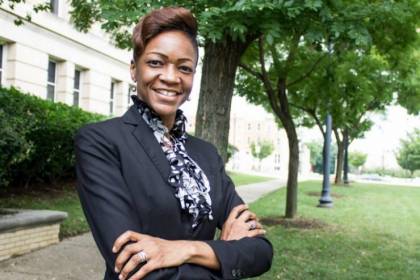Dyslexia Advocation Inc., a nonprofit that educates, empowers, and equips adults and parents of children with language-based learning disabilities, was awarded the $25,000 Cohort Prize by fellow members of the Social Innovation Lab's 2020–21 cohort.
Based at Johns Hopkins Technology Ventures, the Social Innovation Lab supports innovative, mission-driven companies and disruptive technologies to create change and opportunity in Baltimore and beyond.
The Abell Foundation funded the Cohort Prize, which is announced at the end of SIL's virtual Innovators' Showcase, a presentation of ventures to community members, potential funders, ecosystem representatives, and fellow entrepreneurs.

Image caption: Winifred Winston, founder of Dyslexia Advocation Inc.
The April 27 showcase was the culmination of a five-month program that provided the teams with business support, including funding, advising, technical assistance, and training through a rigorous customer-discovery curriculum geared toward maximizing community impact and sustainability.
Winifred Winston, Dyslexia Advocation's founder, has been a champion for her 11-year-old daughter since she was diagnosed with dyslexia four years ago. The more she worked with her daughter, the more she saw how Black communities and other underrepresented minority groups lacked access to information about dyslexia and resources to support their children with the learning disability.
A former high school teacher, Winston watched one of her students struggle to get a job because of her learning disabilities. When Winston had a corporate job, a colleague who knew about her advocacy for her daughter asked Winston for help with an employee with dyslexia.
Winston then decided to start her nonprofit to help parents offset the cost of quality advocacy services, specialized tutoring, and neuropsychological evaluations as well as to help businesses integrate supports for neurodiversity into the workplace. She has built an online following thanks to a #BlackandDyslexic social media campaign she launched to highlight Black celebrities and noncelebrities to raise awareness. She is launching a podcast this summer through a grant from Morgan State University to raise awareness of learning disabilities in minority communities.
"From the moment Winifred interviewed for SIL, she was on a mission," says Madison Marks, SIL's director. "Throughout the cohort, I saw Winifred taking advantage of every opportunity, speaking to others about her business, and building a support network around her. Her confidence in her leadership and purpose in leading Dyslexia Advocation was evident. During the internal cohort pitch, her progress, plan for the future, and potential impact were clear to other cohort members."
Winston says she got emotional when she was announced as the $25,000 prize winner because the vote of the other teams meant they believed in her work. She called the money "icing on the cake" because she learned so much from taking part in SIL and praised the program for keeping her on track.
"That accountability is key because every week I had to do a report listing what I did this week, what I'm doing next week, and what I did for self-care," she says. "It made you show up on days you didn't want to show up, the days you felt frustrated and defeated. Mission-driven work is not easy. Having that accountability, that structure, is essential to your ongoing success."
The coronavirus pandemic forced the SIL teams to meet online, but Marks says being remote allowed the entrepreneurs to connect with people during customer discovery who otherwise might not have been available. Each team made progress in its own way, she adds, whether they validated their approach or found new avenues to grow.
"There were a lot of wins throughout in terms of cohort members' enhanced confidence, getting into a rhythm of working as a team, or realizing the need to pivot," Marks says.
Applications for the 2021–22 cohort, which will operate on a hybrid model with in-person and virtual programming, will open in August.
Posted in University News
Tagged startups, johns hopkins technology ventures, social innovation lab








